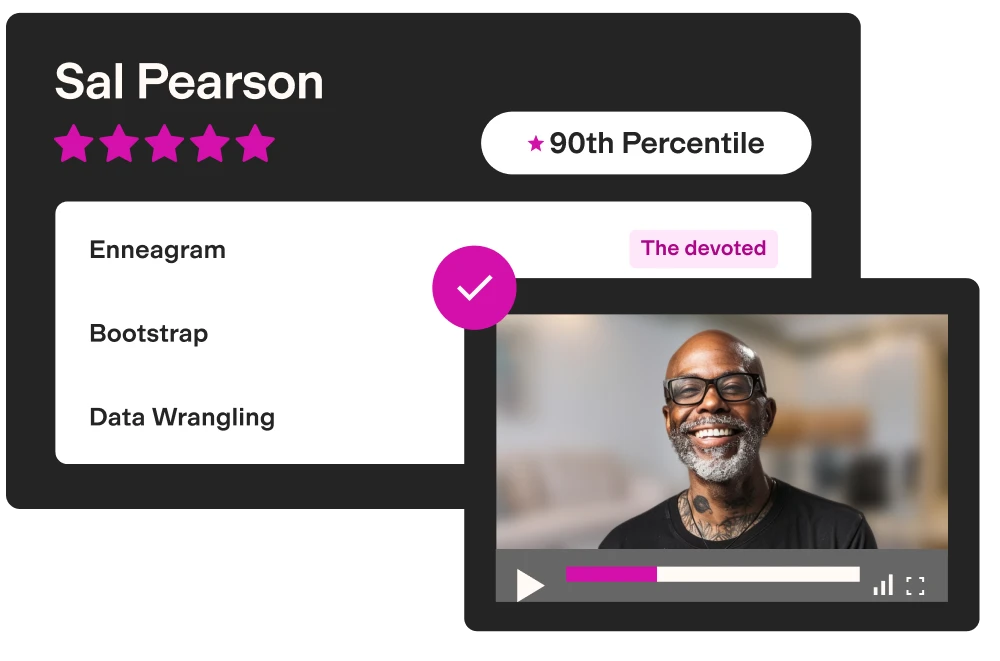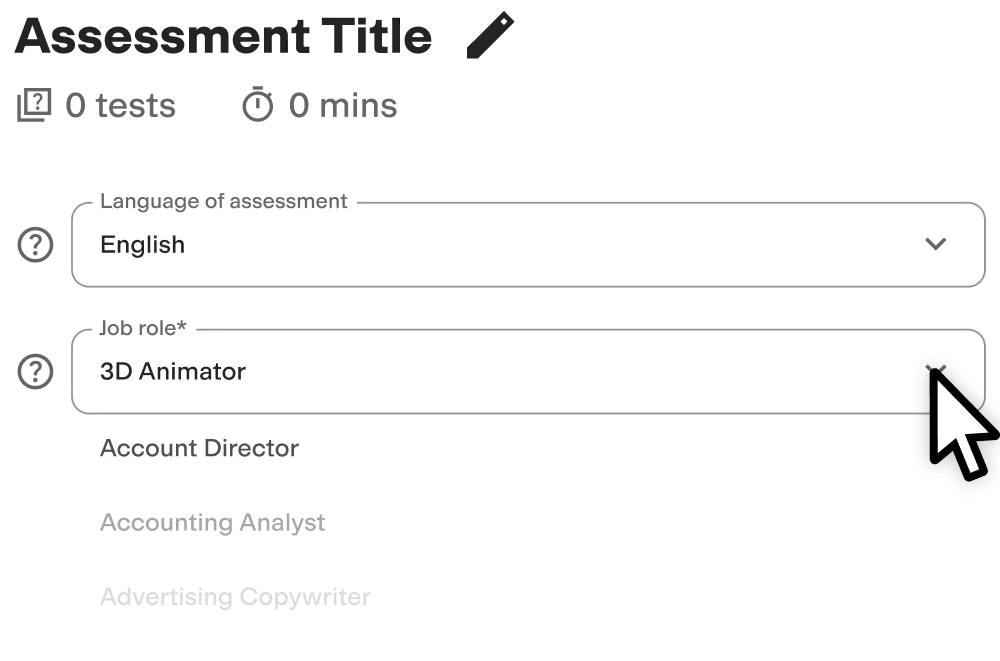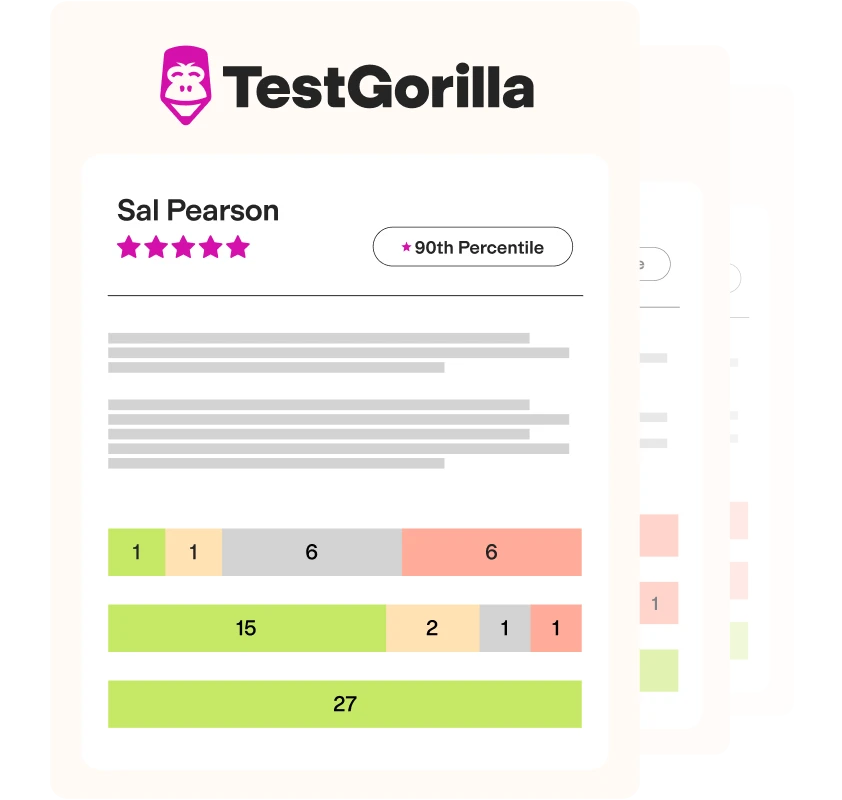Data Science test
Summary of the Data Science test
Our Data Science test assesses candidates’ fundamental knowledge of statistics, data science, programming, machine learning, and neural networks. This skill test is designed to help you evaluate data science skills at an intermediate level.
Covered skills
Statistics
Fundamentals of data science and programming
Machine learning
Neural networks and deep learning
Use the Data Science test to hire
Data scientists, data analysts, forecasting analysts, modeling analysts, machine learning scientists, or other roles that require a good knowledge of data science.
About the Data Science test
The Data Science test helps you determine whether your candidates have a theoretical understanding of statistics and probability and a practical ability to work with information in the complex field of data science.
It evaluates candidates’ abilities across four key skill areas:
Statistics: Data analysis concepts such as probability, distributions, regression, and hypothesis testing are essential for analyzing data and making predictions
Fundamentals of data science and programming: Understanding data manipulation, cleaning, and programming languages like Python helps solve data problems
Machine learning: Using machine algorithms enables candidates to build, train, and validate predictive models based on existing datasets
Neural networks and deep learning: The use of neural networks for complex pattern recognition and deep learning helps workers handle large datasets
Hiring candidates proficient in these areas enables your organization to gain better insights from vast amounts of data that drive strategic decision-making processes.
Their skills contribute to more accurate forecasting models, better customer segmentation strategies, and new product ideas based on trend analysis.
This 10-minute, intermediate-level test consists of 20 multiple-choice questions designed around real-world data challenges.
The test is made by a subject-matter expert
TestGorilla’s tests are created by subject matter experts. We assess potential subject-matter experts based on their knowledge, ability, and reputation.Before being published, each test is peer-reviewed by another expert, then calibrated using hundreds of test takers with relevant experience in the subject.
Our feedback mechanisms and unique algorithms allow our subject-matter experts to constantly improve their tests.
Vincent F.
Vincent has one mission: to share his expertise in data science and increase data literacy - a goal that’s evident in all of his endeavours. His greatest pleasure stems from teaching the fundamentals of data science in a way that’s accessible to all students.
Having worked for several years for companies big and small, Vincent is now taking his data science proficiency to the next level: he’s currently working on his Master’s thesis in machine learning and operations research.
Reliability: Cronbach’s alpha coefficient = .77
Face validity: Candidates rated this test as accurately measuring their skills (average score of 3.72 out of 5.00).
Criterion-related validity: Candidates with higher scores on this test received higher average ratings from the hiring team during the selection process (r = .38, N = 118).
For an in-depth look at interpreting test results, please take a look at our Science series articles: How to interpret test fact sheets (part 1): Reliability, and How to interpret test fact sheets (part 2): Validity.
For an explanation of the various terms, please refer to our Science glossary.
Reliability and Validity | Sufficient data available | Analyses and checks conducted | Outcome |
|---|---|---|---|
Reliability | ✔ | ✔ | Acceptable |
Content validity | ✔ | ✔ | Acceptable |
Face validity | ✔ | ✔ | Acceptable |
Construct validity | Pending | Pending | Pending |
Criterion-related validity | ✔ | ✔ | Acceptable |
Group validity | |||
Age differences | Pending | Pending | Pending |
Gender differences | Pending | Pending | Pending |
Ethnicity differences | Pending | Pending | Pending |
Use TestGorilla to hire the best faster, easier and bias-free
Our screening tests identify the best candidates and make your hiring decisions faster, easier, and bias-free.
Create high-quality assessments, fast
Building assessments is a breeze with TestGorilla. Get started with these simple steps.
Why are data science skills important to employers?
Data science skills are important to employers because they help gather insights that drive efficiency, growth, and innovation. For hiring managers and recruiters, finding candidates with strong data science skills brings tangible benefits to various departments, such as:
Marketing: Data science skills help optimize marketing channels, enable better lead targeting, maintain customer loyalty, and generate predictive analyses to anticipate trends and improve campaign success
Sales: These skills enhance lead generation, streamline processes, forecast sales trends, improve cross-sell and upsell opportunities, maximize customer lifetime value, and reduce churn
Human resources: Data science skills help analyze employee sentiment, reduce turnover, refine learning and development programs, streamline recruitment, and improve the onboarding process
Beyond these departments, data science skills support business intelligence, system security, and complex data interpretations. These benefits contribute to smarter strategies and stronger performance across the organization.
4 data science competencies to look for
No matter what Data Science skills test you decide to use for technical hiring, it’s crucial to ensure it measures the necessary technical skills for handling complex data challenges.
Here are four critical data science competencies to look for:
Statistics: Beyond basic analysis, candidates should excel in applying statistical analysis models to solve business problems and interpret complex datasets
Machine learning: Look for applicants who can work with real-world data and optimize models for accuracy to help your business innovate
Data fundamentals and programming: Strong candidates can maintain data pipelines and integrate multiple data sources to create scalable applications
Neural networks and deep learning: Applicants with hands-on experience in neural networks and deep learning can use advanced frameworks to reach valuable conclusions from large datasets
Our Data Science test objectively measures all of these four critical analytical skills. That’s why Orbit Technologies decided to use it along with our other skills tests to hire for data science and engineering roles. As a result, the company managed to minimize bias across the hiring process, improve the quality of new hires, and reduce instant attrition rates by 50%.
What job roles can you hire with our Data Science test?
If you’re looking to fill data science testing jobs, our test ensures you’re hiring candidates with the right skills for the role.
Although the Data Science test is designed to evaluate role-specific skills, it is broad enough to ensure you’re selecting candidates who can thrive in different data-driven environments.
Here are a few key roles you can use this test for:
Data scientists use statistical modeling, machine learning models, and advanced analytics to design applications that optimize processes and decision-making
Data analysts use data mining and exploratory data analysis to study large datasets to uncover actionable insights that help guide business strategy and improve decision-making processes
Forecasting analysts apply predictive models and data trends to predict future outcomes and help companies make informed decisions
Modeling analysts create and optimize methodologies and statistical models that improve operational efficiency and business performance
Machine learning scientists design, build, and deploy machine learning algorithms that solve complex problems and improve data automation processes
A well-designed Data Science test is crucial for validating skills and ensuring you hire candidates with the expertise to turn data into actionable insights for your business.
Create a multi-measure assessment: 4 tests to pair with the Data Science test
Although the Data Science test is an excellent tool for evaluating a candidate’s technical data skills, it only covers one aspect of their abilities. That’s why using a multi-measure approach is the best way to ensure you hire talent with a full range of skills that go beyond data analytics alone.
With TestGorilla, you can combine up to five different tests into a single, comprehensive assessment with metrics that give you all the information you need about each applicant’s skills and aptitude.
You can choose from role-specific, personality, culture, situational judgment, language, and cognitive ability tests.
We recommend pairing the Data Science test with:
Python Entry-Level Algorithms test: Evaluate applicants’ ability to solve algorithmic challenges using Python with a straightforward data science coding test
Critical Thinking test: Measure candidates’ ability to analyze information, identify logical connections, and make good data-cleaning decisions in complex situations
Data Storytelling test: Assess how well candidates can use data visualization to organize complex data into compelling narratives that are easy to understand
DISC Personality test: Evaluate behavioral traits to confirm new hires work well with diverse teams, collaborate effectively, and add to your company’s culture
Interested in learning how much you can save with skills-based hiring? Use our ROI calculator to see the exact benefits for your business!
FAQs
View a sample report
The Data Science test will be included in a PDF report along with the other tests from your assessment. You can easily download and share this report with colleagues and candidates.







